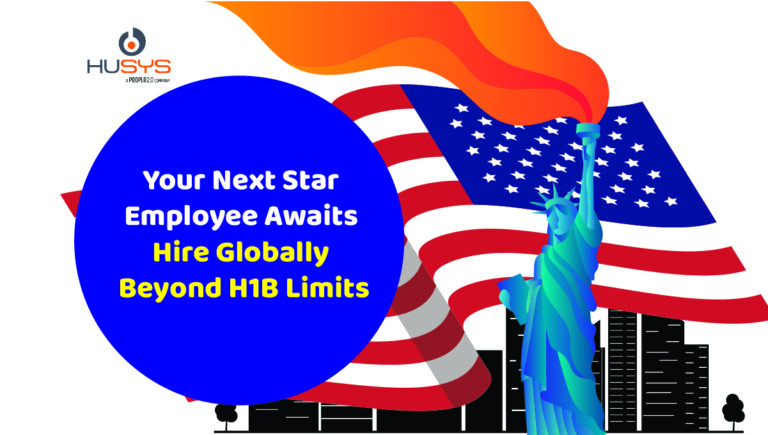The rise of remote work has removed geographical barriers, enabling organizations to hire top talent from across the globe. However, as businesses expand their operations internationally, they encounter the challenge of diverse talent markets with unique skill sets and cultural nuances.
Robust global HR strategies are paramount to effectively navigating this complexity. It encompasses employer branding efforts to showcase the organization’s unique value proposition and attract top talent. Embracing diversity and inclusion in hiring enhances creativity, fosters innovation, and creates a vibrant work environment that attracts diverse perspectives and talents worldwide.
Whether you’ve already created international recruitment strategies or are just starting, this guide is for you. We’ll understand how the global talent workforce works, the importance of employer branding, and top tips to build a high-performing team.
Understanding the Global Talent Market
As you expand your business internationally, navigating and grasping the dynamics of the talent landscape on a global scale becomes crucial. Each region presents unique opportunities and challenges, making it crucial to recognize the varying dynamics and tap into the talent pools that align with your industry’s needs.
Different regions possess distinct strengths and specialties when it comes to talent. For instance, the United States remains a powerhouse in various sectors, including technology, finance, and healthcare. On the other hand, the United Kingdom, particularly London, serves as a global hub for finance, creative industries, and professional services.
Understanding each region’s specific strengths and attributes will enable you to tailor their recruitment strategies effectively.
Additionally, being familiar with local labor laws, cultural nuances, and market trends in these regions enables organizations to navigate international recruitment processes. It also allows them to optimize their employer branding strategies and design attractive compensation packages that align with local norms.
Role of Employer Branding in Hiring the Best Talent
A strong employer brand sets your organization apart, showcasing its values, culture, and employee experience. It helps create a positive perception among candidates, enticing them to choose your organization over others.
An effective employer brand attracts a broader pool of candidates and helps you target the right talent. By communicating your unique value proposition (UVP), you can highlight the benefits of working for your organization and align with candidate expectations.
Here are some tips for building a strong employer brand.
- Define your Employer Value Proposition (EVP): Identify and articulate what sets your organization apart as an employer. Highlight the unique benefits, values, and culture that make your company an attractive workplace.
- Conduct a Brand Audit: Assess your current employer brand perception. Understand how your organization is perceived by employees, candidates, and the public. Identify areas for improvement and align your brand messaging accordingly.
- Showcase your Company Culture: Communicate your company’s values, mission, and work environment. Use social media, employee testimonials, and internal communication channels to give an authentic glimpse into your culture.
- Enhance Candidate Experience: Make the recruitment process positive and engaging. Provide timely feedback, personalized interactions, and a smooth application process. Candidates who have a positive experience are more likely to become brand advocates.
- Develop Employee Advocacy Programs: Empower your employees to become brand ambassadors. Encourage them to share their experiences on social media and participate in industry events. Employee advocacy adds authenticity and credibility to your employer brand.
Expand Your Business Without Settingup Any Entity in 150+ Locations

International Recruitment Strategies for Building a High-Performing Workforce
Your global HR strategies should have the following steps to attract and retain top talent: conducting market research, creating a talent acquisition roadmap, embracing diversity, and fostering a culture of collaboration and growth.
Conduct Thorough Market Research
Market research empowers you to pinpoint talent hotspots and target regions with a high concentration of skilled professionals in your desired fields. It helps you identify areas where talent shortages exist, enabling you to address these gaps through strategic recruitment efforts proactively.
Additionally, market research provides valuable insights into local labor laws, regulations, and cultural nuances that impact talent acquisition. This knowledge is vital for ensuring compliance and designing recruitment processes that resonate with candidates from different cultural backgrounds.
Create a Talent Acquisition Roadmap
Develop a comprehensive plan that outlines your organization’s talent needs, recruitment goals, and strategies for sourcing and attracting international candidates. Determine the most effective recruitment channels to target potential candidates, such as online platforms, local partnerships, or industry-specific networks.
Define a Compelling Employer Value Proposition
Craft a compelling and authentic employer value proposition (EVP) highlighting the unique advantages and benefits of working for your organization. Clearly communicate your EVP through various channels, including your career website, social media platforms, and recruitment campaigns.
Emphasize factors like career growth opportunities, work-life balance, competitive compensation, company culture, and employee recognition. Tailor your messaging to resonate with the aspirations and values of your target candidates, showcasing what sets your organization apart from competitors.
Embrace Diversity and Inclusion
Recognize the value of diversity and inclusion in building a high-performing workforce. Develop and communicate a strong commitment to diversity and inclusion in your recruitment efforts.
Implement strategies to attract diverse talents, such as actively sourcing candidates from underrepresented groups, participating in diversity job fairs, and partnering with organizations that promote diversity and inclusion. Ensure equal opportunities for all candidates during recruitment, promoting fair assessment, unbiased selection, and inclusive interview practices.
Implement Robust Onboarding and Integration Programs
Develop comprehensive onboarding and integration programs specifically designed for international hires. Provide support and resources to help new employees acclimate to the company culture, understand their roles and responsibilities, and navigate any cultural or logistical challenges they may encounter.
Assign mentors or buddy systems to facilitate their integration into the team and provide guidance. Offer cross-cultural training to promote cultural understanding and effective collaboration among diverse teams.
Prioritize Talent Development and Career Growth
Offer opportunities for talent development and career growth to retain top performers and nurture their potential. Implement training programs, mentorship initiatives, and performance management systems that support continuous learning and advancement within the organization.
Provide access to resources, workshops, and conferences that enhance their skills and knowledge. Establish clear career paths and progression opportunities, empowering employees to take ownership of their professional development.
Foster Effective Communication and Collaboration
Create a collaborative work environment that promotes effective communication across global teams. Encourage using communication tools, virtual meetings, and collaborative platforms to facilitate seamless interaction and information sharing.
Provide cultural sensitivity training to employees, enabling them to navigate cultural differences and build strong working relationships. Foster a culture of open communication where ideas and feedback are encouraged and valued, regardless of geographic location.
Managing Remote Workforce With Global PEO Services in 2023
How Can PEO Services Help Build Robust International Recruitment Strategies?
Professional Employer Organizations are crucial in helping organizations build robust international recruitment strategies. Here are some ways in which PEO services can assist:
- Local Expertise: PEOs have in-depth knowledge of local labor markets, employment laws, and cultural norms in various regions. They can provide valuable insights and guidance on sourcing and attracting talent from specific countries or regions.
- Employer of Record Services: PEOs can act as the Employer of Record (EOR) for international hires. This means the PEO becomes the legal employer responsible for payroll, benefits administration, tax compliance, and other HR-related matters.
- Access to Local Networks and Resources: PEOs often have established networks and partnerships in different countries. They can tap into their local connections to source qualified candidates, whether it’s through universities, industry associations, or professional networks.
- Compliance Management: Compliance with local labor laws and regulations is critical when hiring internationally. PEOs are well-versed in local employment laws and can ensure that the recruitment process adheres to all legal requirements, from employment contracts to work permits and visa applications. They help mitigate compliance risks and ensure a smooth and legally compliant international recruitment process.
- Benefits Administration: PEOs often offer comprehensive benefits packages that can be extended to international employees. They handle the administration of employee benefits, such as health insurance, retirement plans, and other employee perks.
- Risk Mitigation: International recruitment comes with inherent risks, such as language barriers, cultural differences, and unfamiliar legal frameworks. PEOs help mitigate these risks by providing guidance and support throughout recruitment. They ensure proper documentation, facilitate effective communication, and offer guidance on compliance and cultural sensitivities, reducing the chances of misunderstandings or legal complications.
Conclusion
Global talent acquisition isn’t difficult, given you have created robust international recruitment strategies. You must also have global HR strategies to handle disputes, ensure compliance, and meet regulatory requirements. However, you can delegate these tasks to a PEO provider like Husys to focus more on expanding your business.




